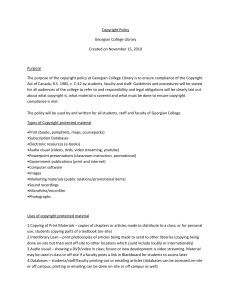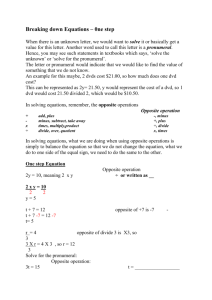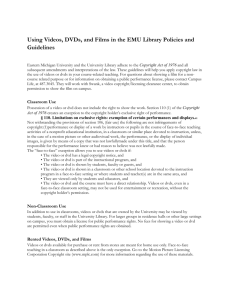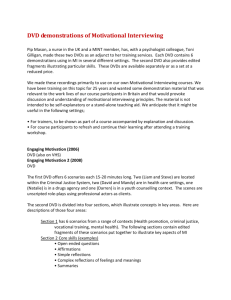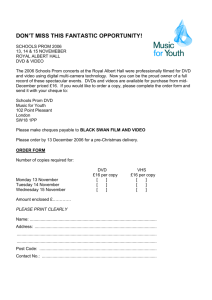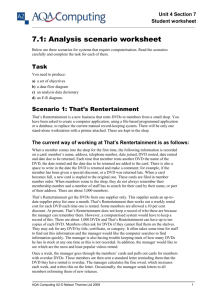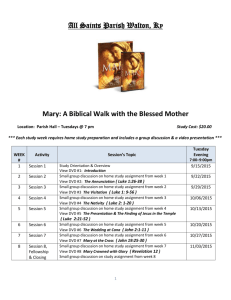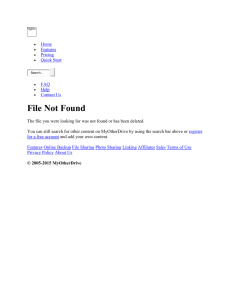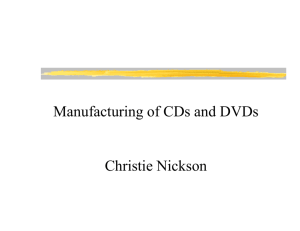Copyright Policy Georgian College Library Created on November 15
advertisement
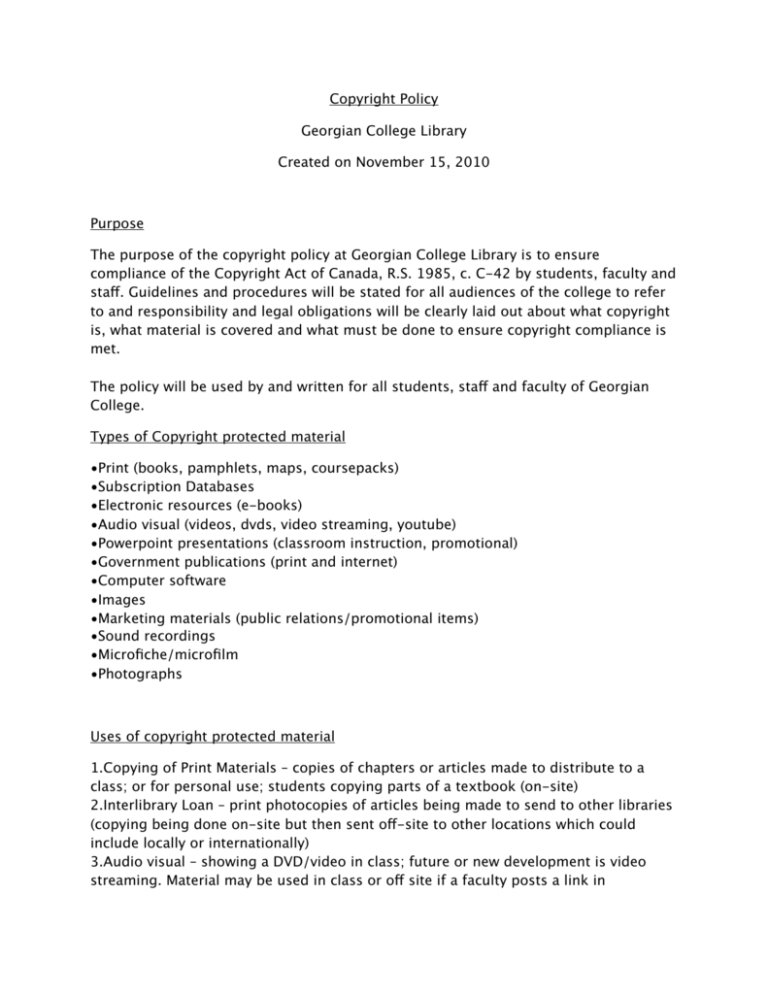
Copyright Policy Georgian College Library Created on November 15, 2010 Purpose The purpose of the copyright policy at Georgian College Library is to ensure compliance of the Copyright Act of Canada, R.S. 1985, c. C-42 by students, faculty and staff. Guidelines and procedures will be stated for all audiences of the college to refer to and responsibility and legal obligations will be clearly laid out about what copyright is, what material is covered and what must be done to ensure copyright compliance is met. The policy will be used by and written for all students, staff and faculty of Georgian College. Types of Copyright protected material •Print (books, pamphlets, maps, coursepacks) •Subscription Databases •Electronic resources (e-books) •Audio visual (videos, dvds, video streaming, youtube) •Powerpoint presentations (classroom instruction, promotional) •Government publications (print and internet) •Computer software •Images •Marketing materials (public relations/promotional items) •Sound recordings •Microfiche/microfilm •Photographs Uses of copyright protected material 1.Copying of Print Materials – copies of chapters or articles made to distribute to a class; or for personal use; students copying parts of a textbook (on-site) 2.Interlibrary Loan – print photocopies of articles being made to send to other libraries (copying being done on-site but then sent off-site to other locations which could include locally or internationally) 3.Audio visual – showing a DVD/video in class; future or new development is video streaming. Material may be used in class or off site if a faculty posts a link in Blackboard for students to access later 4.Databases – students/staff/faculty printing out or emailing articles (databases can be accessed on-site or off campus, printing or emailing can be done on-site or off campus as well) 5.Reserves: Print (books or articles) – chapters placed on reserve for use by students in the library (on-site) Electronic (chapters or articles) – instructors provided with a persistent link to post for class to access virtually (may be on-site or off campu Definition A basic definition of copyright is it means the right to copy or reproduce. Copyright protected works include books, articles, musical and dramatic works, pictures, films, videos, images, sculptures, and computer software (not an exhaustive list). The purpose of copyright is to provide the owner of the work with protection that prohibits others from copying their work without their permission. Copyright team General Manager, Financial as person with legal experience to review agreements and sign for college. Library Director as person who is responsible for signing and negotiating agreements, contracts, and payments. Person who represents and deals with internal infringements or violations. Lead copyright person who oversees copyright for all campuses and stays current on what changes are occurring with copyright and is responsible for educating staff/ faculty/students on the changes and how they impact the library. Responsible for ensuring correct signage,information on handouts, tipsheets, website is displayed stating copyright guidelines. Responsible for being aware of licensing agreements and reporting of statistics to Access Copyright. This person would be contact person for copyright permissions, copyright law clarifications and is first person involved in possible internal infringements. Would be aware of what steps must be taken if an infringement occurs and if an infringement is determined than they would refer it to Library Director. Reports to Library Director on any copyright matter. Audio-visual copyright person who is responsible for checking for PPR rights for videos/DVDs that are purchased for library collection. Also looks after video/DVD reporting form and ensuring agreements are fulfilled and logging statistics related to audio-visual. Reserves copyright person who can check for copyright clearance on documents going on reserve for student use and communicate with faculty about reserve requests. Process to inform others 1) Students - signage posted, FAQ on a LibGuide, tipsheet or handout of what they need to know and where they can look for more information 2)Staff - provide workshops/presentations that could be given on a lunch hour, in a staff meeting, also provide FAQ's that are relevant to what they need, on LibGuide provide overview of copyright and where more information can be found 3)Faculty - coordinate sessions with our centre for teaching and learning to provide copyright presentation to new faculty that are hired, provide presentation that they can sign up for, have information on LibGuide for them, post information in our college newsletter, handouts/tipsheets Licence Agreements Georgian has a license agreement with Access Copyright. This agreement “allows educators and students to copy from millions of copyright protected newspapers, magazines, journals and books, complementing what is allowed under fair dealing, , educational exceptions under the Copyright Act” (from our website http:// library.georgianc.on.ca/Research_Support/Copyright ). We also pay in addition to this license an additional fee “pay-per-use” for articles that are posted digitally for students to ask. We pay a fee based on the number of students in the class. Georgian College has purchased two institutional licencing agreements with AudioCine Films and Criterion Films. This allows students/staff/faculty to show a DVD or movie in class as long as it is reported by using a reporting form we provide and the video/DVD is on one of the lists from these companies. If not, then the copyright holder must be contacted to obtain permission to show it. Process to Clear Copyright Permissions • • • • For print: review Exclusions List from Access Copyright, if work is not listed item may be copied according to copyright rules. If item listed than need to contact copyright owner to obtain copyright clearance. Scanning for e-reserve: based on waiting for intermittent agreement until new bill is decided on we send all items we would like to be placed on reserve to permissions@copyright.com . Then wait for their decision regarding document. For video/DVD: check Audio-Cine Films agreement and Criterion Films agreement. If video is listed item has copyright clearance to be shown in class. If film is not on list then producer/distributor must be contacted to obtain copyright permission. There is a “Standard Reporting Form” to be filled out by staff, faculty and students when wanting to show a video/DVD in class. Fair dealing we must purchase videos/DVDs with Public Performance Rights in order for them to be shown in class. If they do not have PPR then we must obtain permission for them to be shown from the copyright holder. In regards to copying we have an agreement with Access Copyright that gives us advanced permission to photocopy from a variety of print sources as long as they are not on the Exclusions List. Resources Access Copyright site http://www.accesscopyright.ca/ Since we have a Comprehensive licence with them and they provide a lot of assistance with questions I refer to this site a lot. Well laid out and I especially like the FAQ’s. Digital Copyright Listserv http://www.umuc.edu/distance/odell/cip/ listserv_faq.shtml#what%20&%20how I receive emails about what questions other librarians, copyright officers etc. in the field are seeking answers for or what new trends or developments are happening. Michael Geist’s blog http://www.michaelgeist.ca/content/blogsection/0/125/ Provides Canadian copyright information about what is happening in the field. Canadian copyright law, 3rd ed./ Harris, Lesley Ellen I have purchased my own copy to be kept at my desk so I can refer to for clarification or questions I have. It is written in clear language that I am able to understand and provides me with a good foundation for copyright knowledge. Copyright Laws.com http://www.copyrightlaws.com/ A lot of recent information that provides Canadian content. Also offers a list of resources , courses, newsletters and webinairs to help one to stay current in the field FAQ’s What is allowable to be copied based on our license with Access Copyright? (http:// www.accesscopyright.ca/Default.aspx?id=104 ) • Up to 10% of a published work or the following, whichever is greater: i. An entire short story, play, essay or poem from a book or periodical containing other works ii. An entire article from a newspaper, magazine or journal iii. An entire entry from a reference work (encyclopedia, dictionary) iv. An entire reproduction of an artistic work from a publication containing other works v. A whole chapter from a book, as long as that chapter does not comprise more than 20% of the book What is protected by copyright? Books, articles, music, poems, plays, videos/DVDs, images, logos, photographs, computer software. As a teacher how many copies can I make? You can make 2 copies for yourself and one for each student. What can I copy to include in a coursepack? Up to 15% of a publication or entire essay, poem, play, article or short story, whatever is greater Entire chapter no more than 20% of a book Can include up to a maximum of two excerpts written by the same author and published by the same publisher in any 5 year span Maximum of 50% of coursepack may be from textbooks Can I photocopy a textbook? Are allowed to copy a maximum of 5% or an entire chapter that is no more than 20% of the book What is considered a textbook? Primarily intended for classroom instruction Publisher known primarily for producing textbooks If the work has a teacher’s or student’s edition If the title of the work includes Introduction to, Essentials of, Criticism, and or Research to a formal area of study Within the work there are exercises, learning objectives and/or question sets, may include annotations Staff Quiz We currently have a Comprehensive Licence with Access Copyright. True or False Answer = True To show a DVD in class the instructor needs to send us an email. True or False Answer=False The library is part of a scanning licence pilot that allows items to be scanned and placed on e-reserve if they meet copyright guidelines. True or False Answer=True If a faculty/staff wants to use a proprietary logo on material they must contact the copyright owner to obtain permission. True or False Answer=True A photocopy of an article may be put on reserve for students to photocopy. True or False Answer=True The Exclusions Lists lists works that are covered under Access Copyright. True or False Answer=False Copyright means the right to copy or reproduce. True or False Answer=True Only books, articles and music are protected by copyright. True or False. Answer=False
